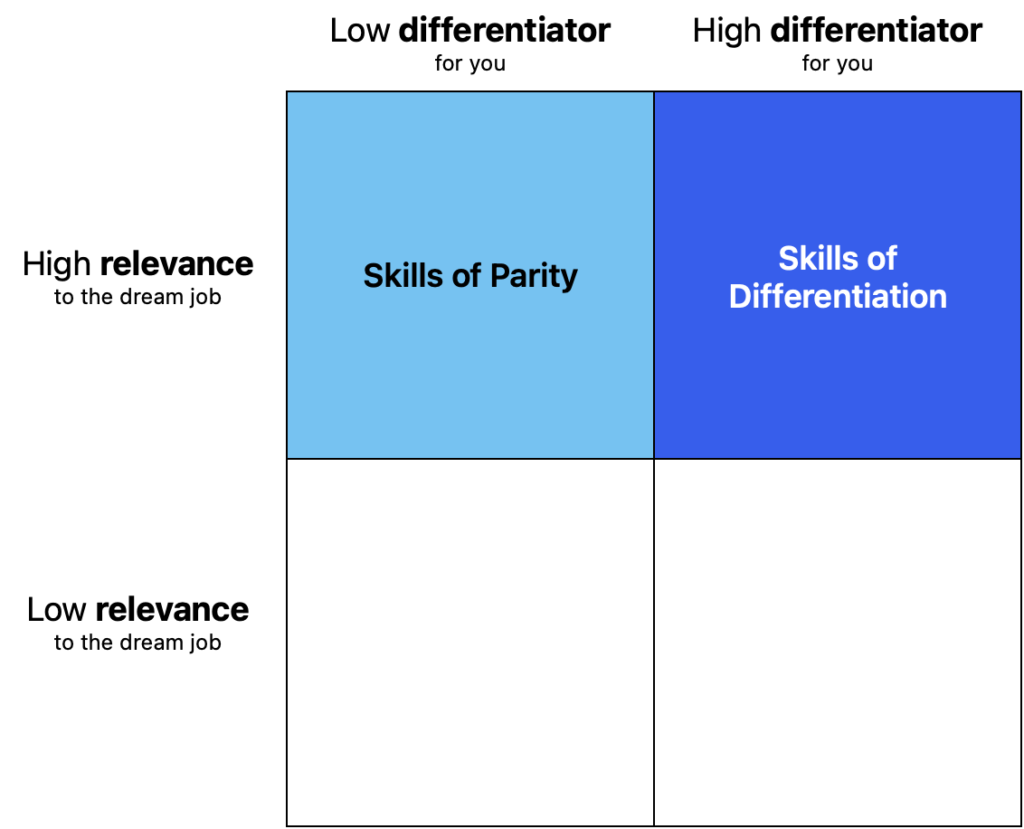You could be an MBA aspirant or an MBA student, and you have a big dream, and a question – how to get your dream MBA job, build wealth, and live a life of freedom? This could be a job in Investment Banking, Consulting, Marketing, Finance, Product Management, HR, Operations, or Analytics etc. However, if you look at the placement trends over the last couple of years, they are concerning to say the least. Would you believe it, even IIM Ahmedabad expects a 10-15% drop in the average salaries for their students this year!
The situation is grim. It is also borderline validating for me. That’s because, since 2019 when I graduated from IIM Udaipur, I have always held the opinion that an MBA student should, and dare I say ‘must’, find their job themselves without depending on the placements.
And let me tell you, the opportunities that lie outside the campus for good students help you create more wealth than the opportunities on campus, in most cases.
What I am telling you now, whatever you will be reading, is what I have been wanting to write for over 5 years. No kidding. I always wanted to give MBA students a clear roadmap to how they can find their dream job after MBA without depending on placements, just like I did during my MBA days.
It took me almost a decade of helping MBA students with their careers using this same roadmap through my courses that gave them exceptional results. And now, I am, for the first time, putting it out as detailed material on my blog. I am sure that this will be read by all MBA aspirants every year.
This is different and life-changing knowledge that you are about to get.
Let us begin.
Understanding What a Dream Job Could Be
I could have moved to the 10 steps to find your dream MBA job directly, but adding this here, right at the start is important. I want you to be limitless in your thought process when you are thinking about a dream job. I want you to dream big.
A dream job need not be just classical full-time employment in a company where you work in any of those pre-defined domains like Marketing, Finance, HR, Operations, Product Management, Consulting etc.
No. And here’s where I want you to start thinking big and nonlinear.
You could also be someone who wants to pursue entrepreneurship and build a business before you graduate from your B-school. That very well is a ‘job’ and that could be your ‘dream job’.
The point is, when thinking about a ‘dream job’, don’t, for even a second, confine yourself to the construct of what a traditional job is.
So, what are the different possible ‘dream jobs’ for an MBA?
- If you want to find a job in any of the conventional domains, that is a ‘dream job’
- If you want to be an entrepreneur and run a small or big business, that is a ‘dream job’
- If you want to be a solopreneur and want to make a big impact all alone, that is a ‘dream job’
- If you know you have the skills and what to sell those skills as a freelancer, that is a ‘dream job’
It could be anything. We are in the digital age and the age of AI, on the brink of the fourth industrial revolution (or is it happening already?), and this is what you need to learn.
That is, the construct of a job is changing, and you need to be ahead of the pack, ahead of everyone else in your B-school in how you think.
So, now that you have this renewed, non-limiting thought process for yourself, I want you to sit back and go through the next 10 steps to finding your dream job after your MBA.
10-Steps to Create Your Dream Job From MBA Without Depending on Placements
This is it. This is where I am putting down the things that I have learned over the last many years. From my experiences of being an MBA student at IIM Udaipur, to being the MBA Product Head at Career Launcher, to now running my own venture Creadom while helping MBA students – this is everything that I know.
This is what is going to help you get a dream MBA job that pays you more than 1 lakh a month, a number most MBA students aspire to reach right out of B-school but don’t. And you could do that without depending on the placements.
I request that you promise yourself that you will be reading this all in just one sitting and will make notes with pen and paper for all the points. Comment on this post how you will be using these 10-point core philosophies in your life.
Each step is crucial. Here we go.
1. Finalize Your Dream Job
Sometimes MBA aspirants and surprisingly even first-year MBA students tell me:
- “Darpan, we will decide our specialization in the second year” or,
- “Sir, I am currently unsure if I want to do Marketing or Finance” or the best,
- “Sir, what do you suggest, what specialization should I go for?”
Here’s what I think about it. And I carry quite a strong opinion on it, backed by logic and data.
I think it’s criminal if you haven’t decided on the domain in which you want to work while you are entering your B-school.
There is no way that you should be even allowed to clear the MBA interviews if you can’t state your career goals properly!
The reality is, and this is the very first of the ten steps, finalize your dream job role immediately. It would be best if you could do it as an MBA aspirant. Whenever you are reading this, you need to finalize your dream job role in the next 48 hours.
You need to finalize your dream career at any of these three levels, best if you can do at level 3.
Level 1 – At a broad dream domain level
Marketing, Finance, Consulting, Investment Banking, Operations etc.
Level 2 – At a dream job role level
Product Manager (in Marketing), Brand Manager (in Marketing), Research Analyst (in Finance), Corporate Finance (in Finance), Tax Consultant (in Investment Banking), Venture Capital (in Investment Banking), Private Equity (in Investment Banking)…and so on.
Level 3 – At a dream company level
For example, Brand Management at HUL, Consulting at McKinsey/BCG/Bain (MBB), Product Management at Microsoft, Tax Consultant at Deloitte..and so on.
But, to finalize this requires knowledge about what that domain or job role is or what that job role does in that company. This becomes easy thanks to LinkedIn, independent educators, and YouTube influencers (like yours truly).
Frankly, it is a one-day job to research it and finalize it.
Once you finalize this, trust me, it is half the battle won.
Most students don’t finalize even their Level 1 dream domain let alone their dream job role. How that screws them over is amazing. Suddenly within 2-3 months of you joining your MBA college, the summer placement interviews take place.
And because you had no goal, you hadn’t prepared for anything specific, you either don’t crack any interview or you most likely settle for whatever you get. And once that happens you have no reason to make a choice, because now you have a summer internship and you are now habitual to go wherever the wind takes you.
Whereas, think of those MBA students around you who have their goals set in their mind right from day one of their MBA program. If you have trouble finding such examples, let me help you.
- Think of a CA, who from the very beginning is clear that they want to get into Finance/Investment Banking and even gets that job.
- Think of an IIT Bombay engineer, who from the very beginning is clear that they want an Operations job and gets that job.
- Think of an MBA senior of yours, who from the very beginning was clear that they wanted to do entrepreneurship. And they sign out of the placements and make it happen.
There are so many examples. Your idols should ideally be those who operate with clarity. It’s cool to have clarity. Suddenly, everything that you will do in your MBA will be aligned with your goal.
This is the crucial first step. Do it today.
2. Discover the Skills Required For It
Once you have finalized your dream job after MBA, you will already start feeling way more confident about yourself. Clarity does have that effect on people.
However, here is what will give you even more clarity and confidence because this will truly help you understand exactly what things you need to prepare yourself to get the dream job.
In this step, you need to find the exact skills that are required for your dream job.
How do you do that? Let me tell you the method that will change how you look at any job role.
Here’s the thing. Any job role in this world, i.e. any job role quite literally, can be broken down into its constituent hard skills and soft skills.
This means, even if you don’t tell me exactly what job you do but if you just tell me the exact hard skills and soft skills that you must have for your job role, I will be able to guess what your work is to a significantly high level of accuracy.
And this applies to all the job roles.
Even the job role of ‘being an entrepreneur’ in a specific business will require you to have certain skills that will not be the same as the ones you will require in another kind of business.
Now, that you know this perspective, I want you to start seeing any of the job roles that come to your campus, or the ones that you apply to, in a very barebones manner. See a job role in terms of its constituent hard skills and soft skills.
Your question would now be, how do you find the exact skills for the dream MBA job that you finalized in the step before this?
Here are some ways in which you can do that.
- Ask your seniors or the placement committee (i.e. ‘placecomm’) for previous year JDs
- Search the job role on a job portal like IIMJobs.com or LinkedIn
- Talk to people on LinkedIn who are already in those jobs
Once you do this, you should have in front of you is a list with two sub-headings i.e. “Hard skills” and “Soft skills” and at least 3-5 skills written in each sub-heading.
When you make this list, I want you to sit back for a minute and realize how powerful it is to have such a list.
That’s because what you have in front of you is the roadmap to that dream job. What is stopping you from mastering those skills (I’ll tell you how) and in the process becoming the person that you want to be?
Nothing is stopping you but yourself. Go ahead and make this list for yourself.
3. Engage in Focused Upskilling
Upskilling is the name of the game when you’re aiming for your dream job, especially when you’re not depending on campus placements.
My YouTube videos and courses are filled with this one piece of advice for students. There’s no greatness in doing skill-hopping i.e. learning a new skill every weekend. And that’s what happens with students.
They learn the skill that is ‘fashionable’ to learn at that point of time. Or the skills that their friends are learning.
But, that’s where you need to be different. You need to engage in Focused Upskilling.
The burning question, therefore, is how do you decide which skills to pick up?
Picture this: a 2×2 matrix where one axis represents Relevance to the Job and the other represents the Differentiation the skill will bring to you. In an ideal world, you’d want to camp out in the top two quadrants, focusing first on skills that are both highly relevant and differentiating.
Prioritizing Skills: The 2×2 Matrix

- Top Left Quadrant (High Relevance, Low Differentiation): Here lie your hygiene skills—essential, but not unique. Think of them as your base layer; without these, you can’t compete.
- Top Right Quadrant (High Relevance, High Differentiation): These are your gold nuggets. Skills here not only fit the job perfectly but also set you apart from the crowd.
Your strategy? Start with the top-right quadrant to stand out, but don’t ignore your base layer in the top-left. It’s a balancing act between being unique and covering the basics.
Where to Learn – The Controversial Opinion
Now, onto the big question: Where should you learn these skills? Here’s my take, and it might stir some feathers—it doesn’t matter where you learn from.
That’s right. The chase for prestigious certificates is a distraction. It’s not the certificate that lands you the job; it’s your skillset.
Platforms like Coursera, Udemy, or even YouTube can be your learning playground. Each has its strengths, but the end goal remains the same: acquiring the skills. A structured course always speeds up the process, offering a clear path through the jungle of knowledge.
However, if you’re disciplined and motivated, free resources like YouTube tutorials can be just as effective.
The bottom line? Focus on skills, not certificates.
Your ability to apply what you’ve learned is infinitely more valuable than a piece of paper. So, dive into learning with an open mind. Whether it’s through a paid course that offers structure or a self-guided journey through free resources, what matters is the knowledge you gain and how you apply it.
Finally, what you need to understand is that engaging in focused upskilling is about smart choices—both in what you learn and where you learn it from. Use the 2×2 matrix to prioritize skills that not only make you job-ready but uniquely stand out.
And when it comes to learning platforms, remember that the best resource is the one that gets you to your goal. Skills over certificates, always. This mindset is not just about getting you ready for the job market; it’s about setting you up for a career of continuous growth and success.
4. Create Content for Learning and Branding
Let me tell you about something I did during my MBA that helped me stand out. In my first year at IIM Udaipur, I started writing a marketing blog. This wasn’t just a hobby; I saw it as my own little business. Every week, I’d write new posts on different marketing topics. Here’s what happened:
- My posts started showing up on Google, making it easy for people to find me.
- I began getting freelance work, which meant I could earn money in US dollars.
- Even better, I got job offers because people saw what I could do online.
The big lesson here is that it’s super important not just to learn new things, but also to show what you can do.
This is called learning in public.
Why Marketing for me? That’s because I wanted to do extremely focused skill-building, exactly what I recommended in the section above. My blog was a medium for me to use what I was learning in my MBA, like how to attract more readers and make my blog popular.
Why Sharing Online Works
A blog is great because you can write a lot and go deep into topics. But that’s not the only way to share what you know. Making videos for YouTube is another awesome option because you can talk about what you’re learning and show your personality more.
And don’t just stop there. Being active on other websites like LinkedIn, Quora, and Instagram helps too. Each one is a different way to share your skills and connect with people who might be interested in what you have to say.
At this point, I will just simply share with you some examples who have done exceedingly well in content creation as MBAs.
Take inspiration from people like Shweta Arora, The IIM Guy, Ananta Chhajer, Shatakshi Sharma, Ankur Warikoo, and yes, myself, Darpan Saxena. We’ve all used platforms like YouTube, LinkedIn, and Instagram to share our expertise and carve out our niches.

How You Can Do It Too
- Kickstart Your Platform: Whether it’s a blog or a YouTube channel, see it as your project. It’s your space to share your learning journey. Like Ankur Warikoo, who opens up about his entrepreneurial adventures and life lessons, your story is powerful.
- Put Your Learning to Test: Don’t just showcase your skills; apply them in real-world scenarios and share those case studies. For example, I, on my blog, used to apply the marketing concepts like 4Ps and STP on various companies like Amul and Pepsi.
- Expand Your Digital Footprint: Don’t confine yourself to just one platform. Ananta Chhajer extends his reach by sharing his MBA insights across both YouTube and Instagram, connecting with diverse audiences.
- Build Your Community: Engagement is key. Shweta Arora excels in building online communities by actively interacting with their audience. And as for me, Darpan Saxena, I’ve used my blog and online presence as a bridge to connect with countless individuals looking to advance their careers.
Easy Steps to Get Noticed
- Start Sharing: Begin with a blog or YouTube channel. Think of it like it’s your project or small business. It’s a place to share everything you’re learning and doing.
- Make It Your Practice Field: Use your blog or channel to try out all the cool stuff you learn. It’s not just about telling people what you know; it’s about showing them how you use what you know to do cool things.
- Be Everywhere: Don’t just stick to one website. Use different sites to talk about your work and connect with more people. Each site has its audience, and being at more than one place helps you get noticed by more people.
By following these simple steps, you can make a big splash online. It’s not just about having skills; it’s about showing them off in a way that gets people’s attention. When you share what you know and do it in a fun and interesting way, you open up new doors for yourself.
This was the part – 1 of this detailed blog post. I decided to write it parts so that I can get your feedback on this one and also cover somethings that you may want me to in the part – 2.
So, go down in the comments and let me know what you learned from it. And I will write the part – 2 and share it with you here.

Get your dream MBA job or placement
A unique 7-day program to build a high-impact profile for attracting your dream placement and off-campus job offers

 Get access to such unique MBA career insights
Get access to such unique MBA career insights


Excellent blog✨. Need still more blogs in upcoming days.
Thanks, Sahana! Surely, do check your inbox for the next newsletter.